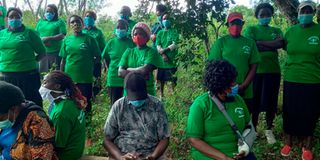Terror widows of Nyeri find solace in bee keeping

Members of Change Ambassadors group at Chaka in Nyeri.
What you need to know:
- At a quarry in Chaka, Kieni Constituency, women who have had to fill the shoes of their husbands, killed by Al Shabaab militia in Mandera.
- To fend for their families, these women formed a self-help group, Change Ambassadors Beekeepers, comprising of 40 women widowed by terrorism.
A string of terror attacks targeting non-locals in Mandera County left dreams shattered, homes broken, bread winners killed and young women widowed.
Scores of men from Nyeri, who were in search of greener pastures in Mandera quarries, were either killed or incapacitated by gunshot wounds.
The biggest casualties of these occurrences, however, were women and children, who had to learn how to navigate about life by themselves.
At a quarry in Chaka, Kieni Constituency, women who have had to fill the shoes of their husbands, killed by Al Shabaab militia, tough it out with their male counterparts, under the scorching sun to feed their families.
Theresa Wangu, a mother of five dreads the day she got news of her husband’s death. He left behind five children - a two-weeks-old infant and the rest in primary and high school.
And without letting her grieve the loss of her husband, her in-laws gave her verbal dress-downs and consequently chased her out of their home.
"They justified their actions saying he had not finished paying my dowry, thus I was not part of the family and neither were my children. They said I could not inherit anything that belonged to him," she says.
Extreme embarrassment
Jane Wairimu and a couple of other widows’ stories replicate Ms Wangu’s. They say they were subjected to extreme embarrassment and harassment in the hands of their in-laws. This drove them out of their homes to the quarries and other menial jobs to support their livelihoods.
Majority of Chaka people predominantly depend on working in quarries but they started migrating to Mandera as local quarries were getting empty and paid less.

Rose Nyamathira, an official of Change Ambassadors group next to one of their bee houses at Chaka in Nyeri, on March 24, 2021.
Quarry owners in Mandera are known to pay well, which attracted quarry workers.
But things got out of hand from 2014 when Al Shabaab started targeting them, with the worst massacre happening in 2016 where dozens of the quarry workers were killed.
They opted for Mandera quarries because the local ones are risky; you have to dig deep to get the raw material, which is not the case there," says Ms Wairimu.
To fend for their families, these women formed a self-help group, Change Ambassadors Beekeepers, comprising of 40 women widowed by terrorism.
They rear bees for honey production, process wax and candles, and other by-products with the intention to tap on the international market.
Menial jobs
"Honey market is broad and it cannot be satiated hence, we are in talks with the government to explore ways we can export our honey to Europe and other countries," notes Ms Theuri.
This venture has helped them move on and improve their livelihoods by augmenting their earnings from the quarry and other menial jobs.
"Our lives are not (comfortable) as they used to be, but we are glad we are together and that our stories are similar; this has helped us trudge on with life a day at a time," says Ms Mary Wairimu, another of the widows.
The women were brought together by Nyeri-based psychologist Rose Theuri and youth leader Richard Waithaka who, touched by their destitute state, figured a way to assist them.
Mr Waithaka took up the role to offer technical support while Ms Theuri offered psychological support.

Members of Change Ambassadors group in Chaka , Nyeri County, in their beekeeping suits.
"We settled on beekeeping because we realised the area has a favourable environment for the venture and it was not a demanding one, which means they could do other things and still have this going for them," says Ms Theuri.
She states that the beekeeping business was inspired by the fact that it does not require huge amounts of money to start.
"We ensured the women underwent the process of psycho-social support and were trained on entrepreneurship and financial literacy as a way to equip them with basic knowledge on how to run a business and savings," she adds.
The biggest challenge among the women Ms Theuri notes, is relapsing.
300 beehives
"One moment they are doing well, the next they are back to grieving their husbands. They suffer from long-term trauma," she says.
To reverse this, the counsellor has ensured they are not exposed to situations that trigger past thoughts.
So far, they have 300 beehives and intend to increase them to 1,000 through support from the local and central government that will also help them get a fully-fledged processing unit that will make their venture commercially viable.
Besides increasing the number of hives to bolster production, they want support in acquiring protective clothes and gears as well as harvesting tools and equipment which they say are costly.
"We want to establish a value chain for honey and by-products, but it is expensive and we cannot afford it," she notes.
They harvest the honey twice a year, with each season giving them eight to 15 kilos on average. A kilogramme goes for between Sh800 and Sh1,000.
Ms Theuri says the women require more training to equip them with knowledge on how to maintain and process the honey.





